A Hurricane Watch has been issued for much of the West Coast of the Florida Peninsula.
From Celestun to Rio Lagartos along the Northern Yucatan Peninsula has been upgraded to a Hurricane Warning by the Government of Mexico.
Anyone in or near the path of this hurricane needs to be ready to put their hurricane safety plan into action. It does look like it will be a major hurricane capable of significant impacts by the time it reaches Florida tomorrow night or Wednesday.
If you get an evacuation order for this storm, I would respect it and get away from the area expected to be hardest hit, get as far safely inland, away from there, as possible. If sheltering in place, I would cross every "t" and dot every "i", so to speak, do all the right things. Because this is not any routine hurricane. This is one of those extra-serious situations unfolding. Taking the right precautions (even if that means evacuating) may save some people's lives.
There is a definite risk of storm surge and flooding with this one, besides just the fierce winds of the hurricane.
Sustained winds are already up to 125 mph which makes it a Category 3 hurricane on the Saffir-Simpson Scale. Its strength may fluctuate up and down before landfall, but we have to consider the possibility that it will be even stronger when it makes landfall. And even if it is "only" roughly this strength, that is still a very significant situation. A lot of damage is likely, and if the right precautions are not taken, we could see people losing their lives, which I don't think anybody wants, while the cleanup from Hurricane Helene has just begun in earnest. You know anybody in the path of this, please encourage them to take this storm seriously, and do whatever you can to help.
000
WTNT34 KNHC 071147
TCPAT4
BULLETIN
Hurricane Milton Special Advisory Number 9
NWS National Hurricane Center Miami FL AL142024
700 AM CDT Mon Oct 07 2024
...AIR FORCE AND NOAA HURRICANE HUNTERS SHOW MILTON RAPIDLY
STRENGTHENING...
...NEW WATCHES AND WARNINGS ISSUED FOR PORTIONS OF MEXICO...
SUMMARY OF 700 AM CDT...1200 UTC...INFORMATION
----------------------------------------------
LOCATION...21.8N 92.2W
ABOUT 165 MI...265 KM WNW OF PROGRESO MEXICO
ABOUT 745 MI...1195 KM WSW OF TAMPA FLORIDA
MAXIMUM SUSTAINED WINDS...125 MPH...205 KM/H
PRESENT MOVEMENT...ESE OR 115 DEGREES AT 8 MPH...13 KM/H
MINIMUM CENTRAL PRESSURE...945 MB...27.91 INCHES
WATCHES AND WARNINGS
--------------------
CHANGES WITH THIS ADVISORY:
The government of Mexico has issued a Hurricane Watch and a
Tropical Storm Warning from south of Celestun to Campeche.
SUMMARY OF WATCHES AND WARNINGS IN EFFECT:
A Hurricane Warning is in effect for...
* Celestun to Rio Lagartos
A Hurricane Watch is in effect for...
* Rio Lagartos to Cabo Catoche
* Campeche to south of Celestun
* Florida Gulf coast from Chokoloskee to the mouth of the Suwanee
River, including Tampa Bay
* Dry Tortugas
A Storm Surge Watch is in effect for...
* Florida Gulf coast from Flamingo northward to the mouth of the
Suwannee River, including Charlotte Harbor and Tampa Bay
A Tropical Storm Warning is in effect for...
* Rio Lagartos to Cancun
* Campeche to south of Celestun
A Tropical Storm Watch is in effect for...
* Florida Gulf coast from Flamingo to south of Chokoloskee
* Florida Gulf coast north of the mouth of the Suwanee River to
Indian Pass
* Lower, Middle, and Upper Florida Keys, including Florida Bay
A Hurricane Warning means that hurricane conditions are expected
somewhere within the warning area. A warning is typically issued
36 hours before the anticipated first occurrence of
tropical-storm-force winds, conditions that make outside
preparations difficult or dangerous. Preparations to protect life
and property should be rushed to completion.
A Tropical Storm Warning means that tropical storm conditions are
expected somewhere within the warning area within 36 hours.
A Storm Surge Watch means there is a possibility of life-
threatening inundation, from rising water moving inland from the
coastline, in the indicated locations during the next 48 hours.
For a depiction of areas at risk, please see the National Weather
Service Storm Surge Watch/Warning Graphic, available at
hurricanes.gov.
A Hurricane Watch means that hurricane conditions are possible
within the watch area. A watch is typically issued 48 hours
before the anticipated first occurrence of tropical-storm-force
winds, conditions that make outside preparations difficult or
dangerous.
A Tropical Storm Watch means that tropical storm conditions are
possible within the watch area, generally within 48 hours.
Interests in the remainder of the Yucatan peninsula of Mexico, the
Florida Peninsula, the Florida Keys, and the northwestern Bahamas
should monitor the progress of this system. Additional watches and
warnings will likely be issued later today.
For storm information specific to your area in the United
States, including possible inland watches and warnings, please
monitor products issued by your local National Weather Service
forecast office. For storm information specific to your area
outside of the United States, please monitor products issued by
your national meteorological service.
DISCUSSION AND OUTLOOK
----------------------
At 700 AM CDT (1200 UTC), the eye of Hurricane Milton was located
near latitude 21.8 North, longitude 92.2 West. Milton is moving
toward the east-southeast near 8 mph (13 km/h). An eastward to
east-southeastward motion is forecast through tonight, followed by a
turn toward the east and northeast on Tuesday and Wednesday. On the
forecast track, Milton is forecast to move near or just north of
the Yucatan Peninsula today and Tuesday, then cross the eastern
Gulf of Mexico and approach the west coast of the Florida Peninsula
by Wednesday.
Maximum sustained winds have increased to near 125 mph (205 km/h)
with higher gusts. Milton is a category 3 hurricane on the
Saffir-Simpson Hurricane Wind Scale. Further strengthening is
expected, and Milton is forecast to become an extremely dangerous
category 4 hurricane later today and maintain that intensity for
the next couple of days.
Hurricane-force winds extend outward up to 35 miles (55 km) from the
center and tropical-storm-force winds extend outward up to 80 miles
(130 km).
The estimated minimum central pressure is 945 mb (27.91 inches)
based Air Force dropsonde data.
HAZARDS AFFECTING LAND
----------------------
Key Messages for Hurricane Milton can be found in the Tropical
Cyclone Discussion under AWIPS header MIATCDAT4 and WMO header
WTNT44 KNHC and on the web at hurricanes.gov/text/MIATCDAT4.shtml
STORM SURGE: A storm surge will raise water levels by as much as 3
to 5 feet above ground level along the northern coast of the
Yucatan Peninsula in areas of onshore winds. Near the coast, the
surge will be accompanied by large and destructive waves.
The combination of a dangerous storm surge and the tide will cause
normally dry areas near the coast to be flooded by rising waters
moving inland from the shoreline. The water could reach the
following heights above ground somewhere in the indicated areas if
the peak surge occurs at the time of high tide...
Anclote River, FL to Englewood, FL...8-12 ft
Tampa Bay...8-12 ft
Yankeetown, FL to Anclote River, FL...5-10 ft
Englewood, FL to Bonita Beach, FL...5-10 ft
Charlotte Harbor...5-10 ft
Bonita Beach, FL to Chokoloskee, FL...4-7 ft
Suwannee River, FL to Yankeetown, FL...3-5 ft
The deepest water will occur along the immediate coast near and to
the south of the landfall location, where the surge will be
accompanied by large and dangerous waves. Surge-related flooding
depends on the relative timing of the surge and the tidal cycle,
and can vary greatly over short distances. For information
specific to your area, please see products issued by your local
National Weather Service forecast office.
For a complete depiction of areas at risk of storm surge
inundation, please see the National Weather Service Peak Storm
Surge Graphic, available at
hurricanes.gov/graphics_at4.shtml?peakSurge.
RAINFALL: Rainfall amounts of 5 to 10 inches, with localized totals
up to 15 inches, are expected across portions of the Florida
Peninsula and the Keys through Wednesday night. This rainfall brings
the risk of considerable flash, urban, and areal flooding, along
with the potential for moderate to major river flooding.
Milton will also produce rainfall totals of 2 to 4 inches across
portions of the northern Yucatan Peninsula.
For a complete depiction of forecast rainfall associated with
Hurricane Milton, please see the National Weather Service Storm
Total Rainfall Graphic, available at
hurricanes.gov/graphics_at4.shtml?rainqpf and the Flash Flood Risk
graphic at hurricanes.gov/graphics_at4.shtml?ero.
WIND: Hurricane conditions are expected in the warning area in
Mexico beginning late today or tonight, with tropical storm
conditions expected to begin as early as this morning. Hurricane
conditions are possible in the watch area in Mexico beginning
tonight and Tuesday, and tropical storm conditions are expected in
the tropical storm warning area beginning later today. Hurricane
conditions are possible in the Hurricane Watch area in Florida on
Wednesday, and tropical storm conditions are possible in the
Tropical Storm Watch area on Wednesday.
SURF: Swells generated by the system are affecting the coast of the
southwestern Gulf of Mexico. These swells are expected to spread
northward and eastward along much of the Gulf Coast within the next
day or two, and are likely to cause life-threatening surf and rip
current conditions. Please consult products from your local
weather office.
NEXT ADVISORY
-------------
Next complete advisory at 1000 AM CDT.
$$
Forecaster Blake
000
WTNT44 KNHC 071149
TCDAT4
Hurricane Milton Special Discussion Number 9
NWS National Hurricane Center Miami FL AL142024
700 AM CDT Mon Oct 07 2024
Recent data from both NOAA and Air Force Hurricane Hunter aircraft
indicate that Milton continues to rapidly strengthen. The Air
Force aircraft very recently reported a peak flight-level wind of
120 kt, and dropsonde data show that the pressure has fallen to
around 945 mb, which is down about 9 mb from a previous dropsonde
report from the NOAA aircraft about an hour ago. This special
advisory is being issued to increase the initial intensity to
110 kt, and to increase the short term intensity forecast that now
shows a peak wind speed of 135 kt in 24 hours.
The aircraft fixes were also a little south of the previous
forecast track and a southward adjustment to the official track
forecast has been made through 36 hours. Hurricane-force winds
are explicitly forecast to affect the northern coast of Yucatan,
and residents in that area should rush preparations to completion.
The updated track forecast has necessitated the government of Mexico
to issue a Tropical Storm Warning and Hurricane Watch from Celestun
southward to Campeche. The storm surge forecast has been increased
to 3 to 5 feet above ground level for portions of the northern coast
of the Yucatan Peninsula.
No changes to the NHC track or intensity forecast were made after
36 hours.
This special advisory was issued in lieu of the normal intermediate
advisory.
Key Messages:
1. Dangerous hurricane-force winds are expected across portions of
the northern coast of the Yucatan Peninsula. A life-threatening
storm surge with damaging waves is also likely along portions of
the northern coast of the Yucatan Peninsula.
2. There is an increasing risk of life-threatening storm surge and
damaging winds for portions of the west coast of the Florida
Peninsula beginning Tuesday night or early Wednesday. Storm Surge
and Hurricane Watches are now in effect for portions of the west
coast of the Florida Peninsula and residents in that area should
follow any advice given by local officials and evacuate if told to
do so.
3. Areas of heavy rainfall will impact portions of Florida today
well ahead of Milton, with heavy rainfall more directly related to
the system expected later on Tuesday through Wednesday night. This
rainfall will bring the risk of considerable flash, urban, and
areal flooding, along with the potential for moderate to major
river flooding.
FORECAST POSITIONS AND MAX WINDS
INIT 07/1200Z 21.8N 92.2W 110 KT 125 MPH
12H 07/1800Z 21.6N 91.5W 125 KT 145 MPH
24H 08/0600Z 21.8N 89.3W 135 KT 155 MPH
36H 08/1800Z 22.9N 87.5W 130 KT 150 MPH
48H 09/0600Z 24.7N 85.7W 125 KT 145 MPH
60H 09/1800Z 26.4N 83.9W 110 KT 125 MPH
72H 10/0600Z 28.1N 81.7W 75 KT 85 MPH...INLAND
96H 11/0600Z 30.0N 75.5W 55 KT 65 MPH...POST-TROP/EXTRATROP
120H 12/0600Z 31.5N 68.4W 45 KT 50 MPH...POST-TROP/EXTRATROP
$$
Forecaster Blake/Brown
522
WTNT54 KNHC 070908
TDSAT4
Huracán Milton Discusión Número 8
Centro Nacional de Huracanes del SNM Miami FL AL142024
400 AM CDT lunes 07 de octubre de 2024
Milton continúa produciendo un centro denso nublado con nubes más
frías que -80C, y desde la última advertencia un pequeño ojo
irregular ha estado presente. Las estimaciones de intensidad de
satélite han aumentado al rango de 80-100 kt, y en base a esto, la
intensidad inicial se eleva a 85 kt.
El centro ha dado un poco de impulso hacia el sur durante las
últimas horas, y el movimiento inicial es ahora 105/7 kt. Milton se
está moviendo dentro de la porción sur de una amplia depresión de
nivel medio sobre el Golfo de México, y también está siendo
influenciado por el flujo en el lado suroeste de un área de baja
presión sobre el este del Golfo de México. Los modelos globales
sugieren que la vaguada de nivel medio y la superficie baja deben
moverse hacia el este al Atlántico durante las próximas 48 h, con
una segunda vaguada de nivel medio a superior excavando en el
noroeste del Golfo de México.Esta evolución debe hacer que Milton se
mueva hacia el este-sureste a este durante las próximas 36 h más o
menos, seguido de un giro hacia el noreste a una velocidad de avance
más rápida. La guía de trayectoria está en buen acuerdo en que el
huracán cruzará la Península de Florida, pero permanecen diferencias
significativas tanto en la ubicación y el momento de tocar tierra.
El UKMET es el más rápido y más lejos al este, el GFS es más lento y
mucho más al norte, y el canadiense es el más lento y mantener la
tormenta en alta mar más de 24 h más tiempo que los otros modelos.
La nueva trayectoria de pronóstico pide que el centro alcance la
costa oeste de Florida entre 60-72 h en el mejor acuerdo con el
ECMWF y el consenso multimodelo. Debe tenerse en cuenta que el error
promedio de seguimiento del NHC el día 3 es alrededor de 100 millas,
y los usuarios no deben enfocarse en la pista exacta. Después de
tocar tierra, Milton debe girar más hacia el este a medida que se
vuelve extratropical.
Para las primeras 36 h más o menos, Milton debe estar en un ambiente
de cizalladura moderada sobre temperaturas cálidas de la superficie
del mar. Por lo tanto, se espera una intensificación constante a
rápida, y el pronóstico de intensidad continúa pidiendo que el
ciclón se convierta en un huracán de categoría 4. Después de 36 h,
se espera que Milton encuentre un ambiente mucho menos favorable con
fuerte cizalladura y arrastre de aire seco. Por lo tanto, se
anticipa algún debilitamiento antes de que el huracán alcance la
costa del Golfo de Florida. Sin embargo, todavía es probable que el
sistema sea un huracán grande y poderoso al tocar tierra en Florida,
con peligros que amenazan la vida a lo largo de porciones de la
costa. Después de tocar tierra, Milton debe debilitarse y comenzar
la transición extratropical, que debe estar completa para 96 h.
Mensajes Clave:
1. Se esperan condiciones de huracán a través de porciones de la
costa norte de la Península de Yucatán. También es probable que una
marejada ciclónica peligrosa con olas dañinas a lo largo de
porciones de la costa norte de la Península de Yucatán.
2. Hay un riesgo creciente de marejada ciclónica que amenazan la
vida y vientos destructivos para porciones de la costa oeste de la
Península de Florida a partir del martes por la noche o temprano el
miércoles. Las Vigilancias de Marejada Ciclónica y Huracán están
ahora en efecto para porciones de la costa oeste de la Península de
Florida y los residentes en esa área deben seguir cualquier consejo
dado por funcionarios locales y evacuar si se les dice que lo hagan.
3. Áreas de fuertes lluvias afectarán porciones de Florida hoy bien
por delante de Milton, con fuertes lluvias más directamente
relacionadas con el sistema se espera que más tarde el martes hasta
el miércoles por la noche.Esta lluvia traerá el riesgo de
inundaciones considerables repentinas, urbanas y áreas, junto con el
potencial de inundaciones moderadas a mayores de los ríos.
POSICIONES DE PRONÓSTICO Y VIENTOS MÁXIMOS
INIT 07/0900Z 22.1N 92.6W 85 KT 100 MPH
12H 07/1800Z 21.9N 91.3W 100 KT 115 MPH
24H 08/0600Z 22.2N 89.4W 115 KT 130 MPH
36H 08/1800Z 23.1N 87.5W 125 KT 145 MPH
48H 09/0600Z 24.7N 85.7W 125 KT 145 MPH
60H 09/1800Z 26.4N 83.9W 110 KT 125 MPH
72H 10/0600Z 28.1N 81.7W 75 KT 85 MPH...INTERIOR
96H 11/0600Z 30.0N 75.5W 55 KT 65 MPH...POST-TROP/EXTRATROP
120H 12/0600Z 31.5N 68.4W 45 KT 50 MPH...POST-TROP/EXTRATROP
$$
Pronosticador Beven
*** Este producto ha sido procesado automáticamente utilizando un
programa de traducción y puede contener omisiones y errores. El
Servicio Nacional de Meteorología no puede garantizar la precisión
del texto convertido. De haber alguna duda, el texto en inglés es
siempre la versión autorizada. ***
523
WTCA44 KNHC 071149
TASAT4
BOLETÍN
Huracán Milton Advertencia Especial Número 9
Centro Nacional de Huracanes del SNM Miami FL AL142024
700 AM CDT lunes 07 de octubre de 2024
...CAZADORES DE HURACANES DE LA FUERZA AÉREA Y NOAA MUESTRAN A
MILTON FORTALECIÉNDOSE RÁPIDAMENTE...
...NUEVAS VIGILANCIAS Y AVISOS EMITIDOS PARA PORCIONES DE MÉXICO...
RESUMEN DE 700 AM CDT...1200 UTC...INFORMACIÓN
----------------------------------------------
UBICACIÓN...21.8N 92.2W
ALREDEDOR 165 MI...265 KM ONO DE PROGRESO MÉXICO
ALREDEDOR 745 MI...1195 KM WSW DE TAMPA FLORIDA
VIENTOS MÁXIMOS SOSTENIDOS...125 MPH...205 KM/H
MOVIMIENTO ACTUAL...ESE O 115 GRADOS A 8 MPH...13 KM/H
PRESIÓN CENTRAL MÍNIMA...945 MB...27.91 PULGADAS
VIGILANCIAS Y AVISOS
--------------------
CAMBIOS CON ESTA ADVERTENCIA:
El gobierno de México ha emitido una Vigilancia de Huracán y un
Aviso de Tormenta Tropical desde el sur de Celestun a Campeche.
RESUMEN DE VIGILANCIAS Y AVISOS EN EFECTO:
Un Aviso de Huracán está en efecto para...
* Celestun a Rio Lagartos
Una Vigilancia de Huracán está en efecto para...
* Río Lagartos a Cabo Catoche
* Campeche al sur de Celestun
* Costa del Golfo de Florida desde Chokoloskee hasta la boca del Río
Suwanee, incluyendo Tampa Bay
* Tortugas Secas
Una Vigilancia de Marejada Ciclónica está en efecto para...
* Costa del Golfo de Florida desde Flamingo hacia el norte hasta la
boca del Río Suwannee, incluyendo Charlotte Harbor y Tampa Bay
Un Aviso de Tormenta Tropical está en efecto para...
* Río Lagartos a Cancún
* Campeche al sur de Celestun
Una Vigilancia de Tormenta Tropical está en efecto para...
* Costa del Golfo de Florida desde Flamingo al sur de Chokoloskee
* Costa del Golfo de Florida al norte de la boca del Río Suwanee a
Indian Pass
* Lower, Middle, y Upper Florida Keys, incluyendo Florida Bay
Un Aviso de Huracán significa que se esperan condiciones de huracán
en algún lugar dentro del área de aviso. Un aviso se emite
típicamente 36 horas antes de la primera ocurrencia anticipada de
vientos con fuerza de tormenta tropical, condiciones que hacen los
preparativos exteriores difíciles o peligrosos. Los preparativos
para proteger la vida y la propiedad deben apresurarse hasta su
finalización.
Un Aviso de Tormenta Tropical significa que se esperan condiciones
de tormenta tropical en algún lugar dentro del área de aviso dentro
de 36 horas.
Una Vigilancia de Marejada Ciclónica significa que hay una
posibilidad de vida-
amenaza de inundación, por agua ascendente que se mueve tierra
adentro desde el
línea costera, en los lugares indicados durante las próximas 48
horas.
Para una representación de áreas en riesgo, por favor vea el Tiempo
Nacional
Gráfico de Vigilancia/Aviso de Marejadas de Tormenta de Servicio,
disponible en
hurricanes.gov.
Una Vigilancia de Huracán significa que son posibles las condiciones
de huracán dentro del área de vigilancia. Una vigilancia se emite
típicamente 48 horas antes de la primera ocurrencia anticipada de
vientos con fuerza de tormenta tropical, condiciones que hacen los
preparativos exteriores difíciles o peligrosos.
Una Vigilancia de Tormenta Tropical significa que son posibles las
condiciones de tormenta tropical dentro del área de vigilancia,
generalmente dentro de 48 horas.
Intereses en el resto de la península de Yucatán de México, la
Península de Florida, los Cayos de Florida y el noroeste de Bahamas
deben monitorear el progreso de este sistema. Es probable que se
emitan vigilancias y avisos adicionales más tarde hoy.
Para información de la tormenta específica en su área en los Estados
Unidos, incluyendo posibles vigilancias y avisos tierra adentro, por
favor monitoree los productos emitidos por su oficina de pronóstico
del Servicio Nacional de Meteorología local. Para información de la
tormenta específica en su área fuera de los Estados Unidos, por
favor monitoree los productos emitidos por su servicio meteorológico
nacional.
DISCUSIÓN Y PERSPECTIVAS
----------------------
A 700 AM CDT (1200 UTC), el ojo del Huracán Milton se localizó cerca
de la latitud 21.8 Norte, longitud 92.2 Oeste. Milton se está
moviendo hacia el este-sureste cerca de 8 mph (13 km/h). Se
pronostica un movimiento hacia el este a este-sureste hasta esta
noche, seguido de un giro hacia el este y el noreste el martes y el
miércoles. En la trayectoria de pronóstico, se pronostica que Milton
se moverá cerca o justo al norte de la Península de Yucatán hoy y el
martes, luego cruzará el este del Golfo de México y se acercará a la
costa oeste de la Península de Florida para el miércoles.
Los vientos máximos sostenidos han aumentado a cerca de 125 mph (205
km/h) con ráfagas más fuertes. Milton es un huracán de categoría 3
en la Escala de Viento de Huracán de Saffir-Simpson. Se espera un
mayor fortalecimiento, y se pronostica que Milton se convertirá en
un huracán de categoría 4 extremadamente peligroso más tarde hoy y
mantendrá esa intensidad durante los próximos dos días.
Vientos con fuerza de huracán se extienden hacia fuera hasta 35
millas (55 km) desde el centro y vientos con fuerza de tormenta
tropical se extienden hacia fuera hasta 80 millas (130 km).
La presión central mínima estimada es de 945 mb (27.91 pulgadas)
basados en datos de sondas de la Fuerza Aérea.
PELIGROS AFECTANDO TIERRA
----------------------
Mensajes Clave para el Huracán Milton se pueden encontrar en el
Tropical
Ciclón Discusión bajo el encabezado de AWIPS MIATCDAT4 y el
encabezado de la OMM WTNT44 KNHC y en la web en
hurricanes.gov/text/MIATCDAT4.shtml
MAREJADA CICLÓNICA: Una marejada ciclónica elevará los niveles de
agua hasta 3 a 5 pies por encima del nivel del suelo a lo largo de
la costa norte de la Península de Yucatán en áreas de vientos
costeros. Cerca de la costa, la marejada estará acompañada por olas
grandes y destructivas.
La combinación de una marejada ciclónica peligrosa y la marea
causará que las áreas normalmente secas cerca de la costa se inunden
por aguas ascendentes que se mueven tierra adentro desde la costa.
El agua podría alcanzar las siguientes alturas por encima del suelo
en algún lugar en las áreas indicadas si la marejada máxima ocurre
en el momento de la marea alta...
Anclote River, FL a Englewood, FL...8-12 pies Tampa Bay...8-12 pies
Yankeetown, FL a Anclote River, FL...5-10 pies Englewood, FL a
Bonita Beach, FL...5-10 pies Charlotte Harbor...5-10 pies Bonita
Beach, FL a Chokoloskee, FL...4-7 pies Suwannee River, FL a
Yankeetown, FL...3-5 pies
La agua más profunda ocurrirá a lo largo de la costa inmediata cerca
y al sur de la ubicación de la tocada de tierra, donde la marejada
estará acompañada por olas grandes y peligrosas. Las inundaciones
relacionadas con marejadas dependen del momento relativo de la
marejada y el ciclo de mareas, y pueden variar enormemente a
distancias cortas. Para información específica en su área, por favor
vea los productos emitidos por su oficina de pronóstico del Servicio
Nacional de Meteorología local.
Para una representación completa de áreas en riesgo de inundación de
marejada ciclónica, por favor vea el Gráfico de Marejada Ciclónica
del Servicio Nacional de Meteorología, disponible en
hurricanes.gov/graphics_at4.shtml?peakSurge.
LLUVIA: Se esperan cantidades de lluvia de 5 a 10 pulgadas, con
totales localizados de hasta 15 pulgadas, a través de porciones de
la Península de Florida y los Cayos hasta el miércoles por la
noche.Esta lluvia trae el riesgo de inundaciones considerables
repentinas, urbanas y áreas, junto con el potencial de inundaciones
moderadas a mayores.
Milton también producirá totales de lluvia de 2 a 4 pulgadas a
través de porciones de la Península de Yucatán norte.
Para una representación completa del pronóstico de lluvia associada
con el Huracán Milton, por favor vea el Gráfico de Lluvia Total de
Tormenta del Servicio Nacional de Meteorología, disponible en
hurricanes.gov/graphics_at4.shtml?rainqpf y el gráfico de Riesgo de
Inundaciones Repentinas en hurricanes.gov/graphics_at4.shtml? ero.
VIENTO: Se esperan condiciones de huracán en el área de aviso en
México a partir de hoy tarde o esta noche, con condiciones de
tormenta tropical que se espera que comiencen tan temprano como esta
mañana. Son posibles las condiciones de huracán en el área de
vigilancia en México a partir de esta noche y el martes, y se
esperan condiciones de tormenta tropical en el área de aviso de
tormenta tropical a partir de hoy Son posibles las condiciones de
huracán en el área de Vigilancia de Huracanes en Florida el
miércoles, y son posibles las condiciones de tormenta tropical en el
área de Vigilancia de Tormenta Tropical el miércoles.
OLEAJE: Marejadas generadas por el sistema están afectando la costa
del suroeste del Golfo de México. Se espera que estas marejadas se
extiendan hacia el norte y hacia el este a lo largo de gran parte de
la Costa del Golfo dentro del próximo día o dos, y es probable que
causen condiciones de oleaje y corrientes marinas que amenazan la
vida. Por favor consulte los productos de su oficina meteorológica
local.
PRÓXIMA ADVERTENCIA
-------------
Próxima advertencia completa a las 1000 AM CDT.
$$
Pronosticador Blake
*** Este producto ha sido procesado automáticamente utilizando un
programa de traducción y puede contener omisiones y errores. El
Servicio Nacional de Meteorología no puede garantizar la precisión
del texto convertido. De haber alguna duda, el texto en inglés es
siempre la versión autorizada. ***
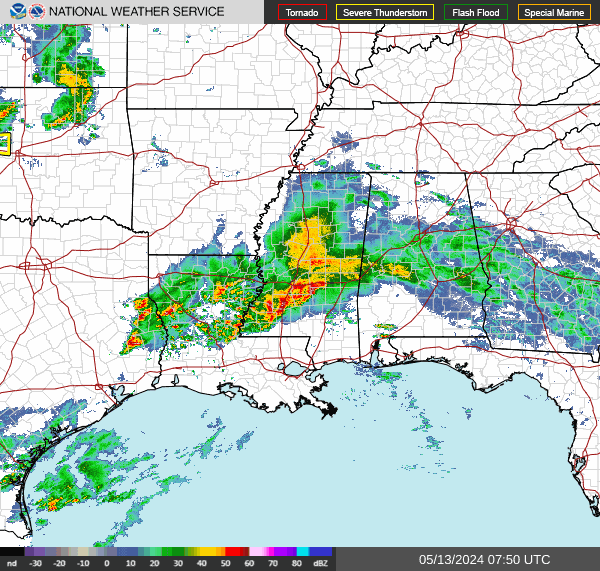
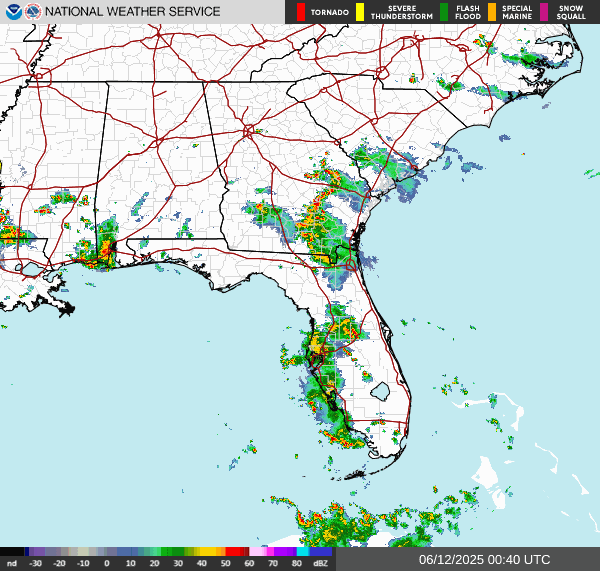




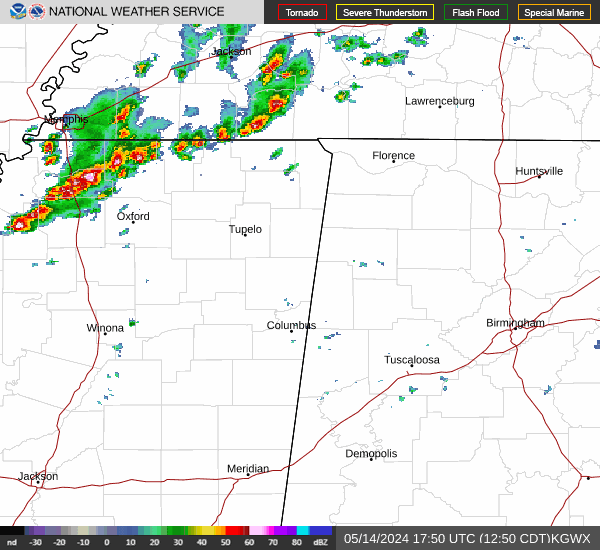
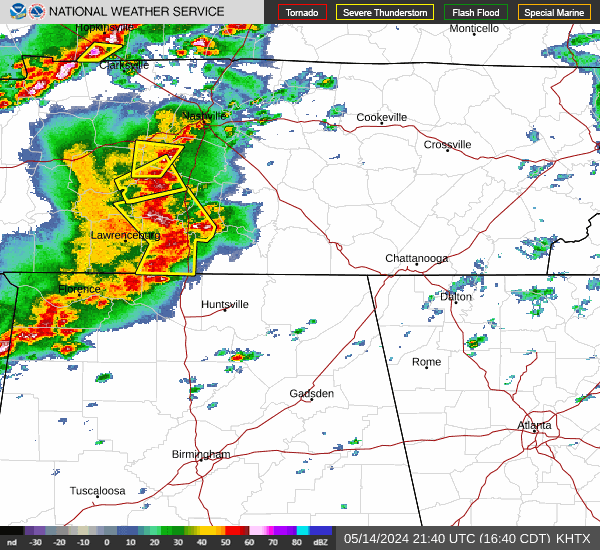
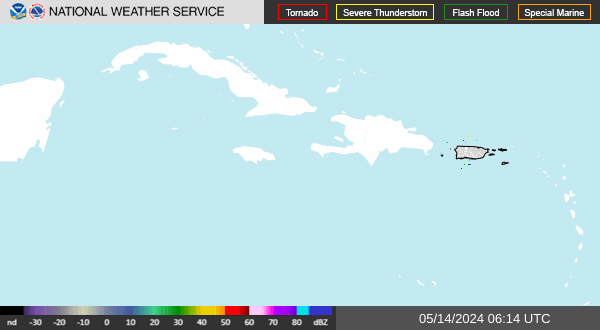




No comments:
Post a Comment